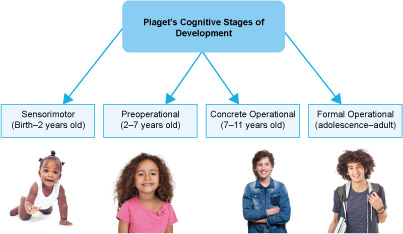Developmental theory
How children learn and develop is a huge area of developmental psychology and there are differing views underlying the experiences children are exposed to. Two theorists in particular have been influential in child development. They are Jean Piaget (1896–1980) and Lev Vygotsky (1896–1934).
Piaget’s theory argued that development occurred mainly through factors internal to the child that are biologically generated and that all children go through stages of development at roughly the same time. Don’t worry too much about the four different stages (although you may want to have a go at Question 1 of the quiz at this point).These stages (Figure 5) are:
- Sensorimotor (0–2 years)
- Preoperational (2–7 years)
- Concrete operational (7–11 years)
- Formal operational (11–15 years)
These are complex stages of cognitive development and if you choose to study child development in more depth, you will learn more about them. The following is a summary of the main features of each stage of development. Piaget argued that all children follow these stages sequentially.
Stage 1: Sensorimotor (0–2 years). The child learns by doing and this includes looking, touching and sucking. They have a basic understanding of cause-and-effect relationships. Object permanence appears at around 9 months.
Stage 2: Preoperational (2–7 years). The child uses language and symbols, including letters and numbers. Egocentrism is evident. Conversation marks the end of the preoperational stage and the beginning of concrete operations.
Stage 3: Concrete operational (7–11 years). The child can demonstrate conversation, serial ordering and a more mature understanding of cause-and-effect relationships.
Stage 4: Formal operational (adolescence–adult). The individual can demonstrate abstract thinking including logic, deductive reasoning, comparison and classification.
In contrast to Piaget’s biologically based stages of development, the Russian, Lev Vygotsky, considered environmental factors, such as the child’s social development, to be more important in stimulating and supporting development. This is known as the theory of social constructivism or socio-cultural theory.
Dafydd and Siân have become aware through Siân’s studies that Vygotsky’s theory is behind what they are doing when they work at home with Tomos on the exercises set by the speech and language therapist.
To give one example, Tomos can make the sounds ‘sss’ and ‘shh’ but he muddles them up, so the speech therapist has asked them to model the sounds they want Tomos to make by saying a simple tongue twister: ‘Smelly shoes and socks shock sisters’ and then encouraging him to copy them.
In just a few days his pronunciation has improved and Tomos has found the activity – the learning experience – to be enjoyable, probably because he finds it funny, having a sister to shock with smelly shoes and socks.
Vygotsky, like Piaget, argued that children learn through play. However, he emphasised the importance of engaging with other children during play. Siân and Dafydd can see how much Mali has benefited from having Tomos there to watch and learn from.
Although they know there are other potential reasons for the differences between the two children, they have noticed that Mali has met milestones, such as crawling and trying to feed herself, much earlier than Tomos. They have also noticed Tomos trying to teach her things, such as how to stack the bricks from her brick trolley, now that she is much more in control of what she can do with her body.

